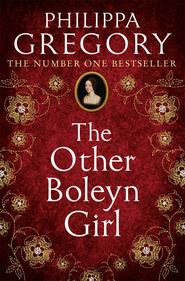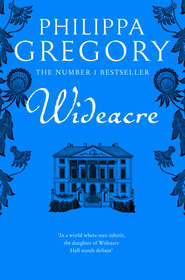По всем вопросам обращайтесь на: info@litportal.ru
(©) 2003-2025.
✖
The Other Queen
Автор
Год написания книги
2019
Настройки чтения
Размер шрифта
Высота строк
Поля
The waiting, the feverish preparation, the arrival of the queen’s own goods all build to a sense of such anxiety that when the lad I have posted at the top of the tower yells out: ‘I see them! They are coming!’ the whole household takes to their heels as if they feared a Spanish invasion instead of one young queen. I can feel my stomach lurch as if I had the flux, and I take off the sacking I have tied at my waist to protect my gown, and I go down to the courtyard to greet this unwanted guest.
It is snowing again, just a flurry, but she has her hood pulled forward over her head to shield herself from the bitter weather, so all I see at first is a big horse and a woman huddled in cloaks in the saddle. My husband is riding at her side and I have an odd, actually, a very odd feeling, when I see him lean towards her as the horses halt. He inclines towards her, as if he would save her the least discomfort or trouble, he looks as if he would spare her the cold wind if he could; and I have a moment when I think that in our businesslike courtship, our well-advised marriage and our cheerful consummation in the big marital bed, that he has never yearned towards me as if he thinks I am fragile, as if he desires to protect me, as if I need protection.
Because I am not. Because I don’t. And I have always been proud of this.
I shake my head to clear such folly and I go briskly forward. My Chatsworth master of horse is holding her horse’s head, and my steward is holding her stirrup. ‘Welcome to Tutbury, Your Grace,’ I say.
It is odd to say ‘Your Grace’ to a young woman again. Elizabeth has been the only queen in England for ten years. She and I have grown old together, I am forty-one, she is thirty-five years old now; and here is a young woman, in her mid-twenties, with an equal claim to the title. She is a queen in her own right in Scotland, she is heir to the throne of England, some would even argue she is the true Queen of England. There are two queens in England now: the one who holds the throne by our good will, and the other one who probably deserves it; and I am in the odd position of being in the service of them both.
My husband the earl is down from his horse already, and he turns to her without even greeting me – as he should do, as is right and proper, though it feels a little odd to me, a newly wed wife. She reaches both arms out to him and he lifts her down from the saddle. Watching the thoughtless ease they have in this embrace reminds me that he has probably lifted her down every noon and night for the ten days of this journey. She must be light as a child, for he swings her down easily, as if in a dance. I know that I would be more of a weight for him. She turns to greet me while still in his arms, one hand casually on his shoulder, as she extends her other hand in the soft leather glove, and I curtsey low.
‘Thank you,’ she says. Her voice is musical, she speaks English like a Frenchwoman – that accent which is the very sound of perfidy and glamour to honest English ears. ‘I thank you for your welcome, Lady Shrewsbury.’
‘Please come in,’ I say, hiding my smile at her pronunciation of Shrewsbury, which is really ridiculously affected. She sounds like an infant learning to talk with her ‘Chowsbewwy’. I gesture towards her lodgings. An anxious glance from my husband asks me if the place is habitable and I give him a little nod. He can trust me. I am a partner in this venture, as I am a partner in this marriage. I shall not fail him, nor he me.
There is a fire in her great hall and she goes towards it and sits herself in the big wooden chair that is drawn close to the blaze for her comfort. Since the wind is in the east the chimney will not blow back a buffet of wood-smoke, please God, and she must admire the table before her, which is spread with a fine Turkey carpet and my best gold abbey candlesticks. The tapestries on the walls are of the very best, woven by nuns, thank God for them, and in her bedroom she will find the bed curtains are of cloth of gold and the coverlet of the richest red velvet which once graced the bed of a most senior churchman.
Everywhere is bright and warm, lit by the great square wax candles that are hers by right of being a queen, and in the sconces against the stone walls there are torches burning. She puts back the hood of her cape and I see her for the first time.
I gasp. I can’t help myself. Truly, I gasp at the most beautiful woman I have ever seen in my life. She has a face like a painting, as an artist might draw. She has the face of an angel. She has thick black hair, cropped like a boy’s, but sparkling at the front now with melting snow. She has dark arched eyebrows and eyelashes so long they sweep her cheeks. Her eyes are dark, dark and clear, and her skin is like porcelain, white and smooth without a single flaw. Her face is perfect like the carving of an angel, a serene heartless face; but what makes her remarkable, unlike anyone I have ever seen before, is her charm. She turns a smile on me and suddenly she is luminous, like a shaft of sunlight, like a sparkle on water, she is like some beautiful thing that makes your heart lift for the mere joy of it. Like the swoop of a swallow in flight which makes you feel glad to be alive. Her smile is like that, is my first foolish thought, her smile is like the swoop of a swallow in flight in midsummer dusk. My second thought is that Queen Elizabeth will hate her like poison.
‘This is a most kind welcome,’ she says in French, then sees my frown as I can’t understand her and she says in hesitant English: ‘You are kind, thank you.’ She holds out her hands to the blaze and then she stands up. Quietly, her lady-in-waiting comes forward and unties the furs at her neck and slips off her wet cloak. She nods her thanks. ‘Lady Shrewsbury, may I present my ladies-in-waiting? This is Lady Mary Seton, and here is Lady Agnes Livingstone,’ she says, and the women and I curtsey to each other and I nod to one of my servants to take the wet cloak away.
‘May I offer you some refreshment?’ I say. I left Derbyshire when I was a girl and I have studied my speech ever since; but even so my voice seems too loud, uncouth in the room. Damn it, I have lived in the greatest houses of the land. I have served Queen Elizabeth and I count Robert Dudley and William Cecil as my personal friends, but I could bite my tongue when I hear the words come out of my mouth clotted with the Derbyshire burr. I flush with embarrassment. ‘Would you like a glass of wine or a mulled ale against the cold?’ I ask, taking extra care with my speech and sounding now stilted and false.
‘Now, what do you like?’ She turns to me as if she is truly interested in my tastes.
‘I’d have a glass of mulled ale,’ I say. ‘I brought it from my brew-house at Chatsworth.’
She smiles. Her teeth are small and sharp, like a kitten’s. ‘Parfait! Let’s have that then!’ she says, as if this is to be a delightful treat. ‘Your husband, his lordship, has told me you are a great manager of your houses. I am sure that you have everything that is the very best.’
I nod to the groom of the servery and know that he will bring everything. I smile at George, who has thrown off his own travelling cloak and is standing at the fireside. We both of us will stand until she invites us to sit, and seeing George, an earl in his own house, standing like a lad before his master, I realise for the first time that we have not allowed a guest into our house but rather that we have joined the court of a queen, and that from now on everything will have to be done as she wishes, and not how I prefer.
1569, Winter, Tutbury Castle: Mary (#ulink_77d2c62d-7bfc-5e45-981a-dfed44654076)
‘And what d’you think of my lady Bess?’ Mary Seton asks me, speaking French for greater discretion, a hint of malice in her voice. ‘Is she as you expected? Worse?’
Now they are gone and we are alone in these pitiful little rooms I can lean back in my chair and let the pain and exhaustion seep through my body. The ache in my side is especially bad tonight. Mary kneels at my feet and unties the laces on my boots and gently pulls them off my cold feet.
‘Oh, I heard so much about what a woman of sense she is and what a grand manager of business that I was expecting a Florentine banker at the very least,’ I say, turning the criticism.
‘She won’t be like Lady Scrope at Bolton Castle,’ Mary warns me. She puts my boots to dry at the fireside and sits back on her heels. ‘I don’t think she has any sympathy for you and your cause. Lady Scrope was a good friend.’
I shrug. ‘Her ladyship thought I was the heroine of a fairytale,’ I say irritably. She was one of those who sees me as a queen of ballads. A tragic queen with a beautiful childhood in France and then a lonely widowhood in Scotland. A balladeer would describe me married to the beautiful weakling Darnley, but longing for a strong man to rescue me. A troubadour would describe me as doomed from the moment of my birth, a beautiful princess born under a dark star. It doesn’t matter. People always make up stories about princesses. It comes to us with the crown. We have to carry it as lightly as we can. If a girl is both beautiful and a princess, as I have been all my life, then she will have adherents who are worse than enemies. For most of my life I have been adored by fools and hated by people of good sense, and they all make up stories about me in which I am either a saint or a whore. But I am above these judgements, I am a queen. ‘I expect no sympathy from her ladyship,’ I say bitterly. ‘She is my cousin the queen’s most trusted servant, as is the earl. Otherwise we would not be housed by them. I am sure she is hopelessly prejudiced against me.’
‘A staunch Protestant,’ Mary warns me.‘Brought up in the Brandon family, companion to Lady Jane Grey, I am told. And her former husband made his fortune from the ruin of the monasteries. They say that every bench in her house is a pew.’
I say nothing; but the small incline of my head tells her to go on.
‘That husband served Thomas Cromwell in the Court of Augmentations,’ she continues softly. ‘And made a fortune.’
‘There would be a great profit in the destruction of the religious houses and the shrines,’ I say thoughtfully. ‘But I thought it was the king who took the profit.’
‘They say that Bess’s husband took his fee for the work, and then some more,’ she whispers. ‘He took bribes from the monks to spare their houses, or to undervalue them. That he took a fee for winking when treasure was smuggled out. But then he went back later and threw them out anyway, and took all the treasure they thought they had saved.’
‘A hard man,’ I observe.
‘She was his sole heir,’ she tells me. ‘She had him change his will so that he disinherited his own brother. He did not even leave money to his children by her. When he died he left every penny of his ill-gained wealth to her, in her name alone, and set her up as a lady. It was from his springboard that she could vault to marry her next husband, and she did the same with him: took everything he owned, disinherited his own kin. At his death he left it all to her. That is how she got enough wealth to be a countess: by seducing men and taking them from their families.’
‘So – a woman of few scruples,’ I remark, thinking of a mother disinheriting her own children. ‘A woman who is the greater power in the household, who has things done to her own advantage.’
‘A forward woman,’ Mary Seton says disapprovingly. ‘Without respect for her husband and his family. A crowing hen. But a woman who knows the value of money.’ She is thinking as I am – that a woman who does not scruple to make her fortune from the destruction of the church of God can surely be bribed to look the other way just once, for just one night.
‘And him? The Earl of Shrewsbury?’
I smile. ‘D’you know, I think he is all but untouchable? All he seems to care for is his own honour and his dignity; and of all men in England, he must be safe in that.’
1569, Winter, Tutbury Castle: Bess (#ulink_9efc73a9-c402-5128-81fd-25972030f9e8)
‘How much are we being paid for her?’ I ask George as we take a glass of spiced wine seated either side of our bedroom fire. Behind us the maids are turning down our bed for the night.
He gives a little start and I realise that I am, once again, too blunt. ‘I beg your pardon,’ I say quickly. ‘Only I need to know for my book of accounts. Is the court to pay us a fee?’
‘Her Majesty the Queen graciously assured me that she will meet all the costs,’ he says.
‘All of them?’ I ask. ‘Are we to send her a note of our expenses, monthly?’
He shrugs his shoulders. ‘Bess, dearest wife … this is an honour; to serve is a privilege that many seek but only we were chosen. The queen has assured me that she will provide. Of course we will benefit from our service to her. She has sent goods from her own household for her cousin, has she not? We have the queen’s own furniture in our house?’
‘Yes,’ I say hesitantly, hearing the pride in his voice. ‘But really, it is only some old things from the Tower. William Cecil wrote to me that Queen Mary’s household is supposed to be thirty people?’
My husband nods.
‘She has come here with at least sixty.’
‘Oh,’ he says. ‘Has she?’
For some reason, known only to men and in this instance a nobleman, he has ridden at the head of a train of a hundred people for ten days and failed to notice.
‘Well, they don’t all expect to be housed here, I suppose?’
‘Some of them have gone to the ale house in the village; but her household – companions, retainers, servants and the grooms – are under our roof, and they are all eating and drinking at our expense.’
‘She has to be served as a queen,’ he says. ‘She is a queen to her fingertips, don’t you think, Bess?’
It is undeniable. ‘She is a beauty,’ I say. ‘I always thought they must be exaggerating when they spoke of her as the most beautiful queen in the world; but she is all of that, and more. She would be beautiful if she were a commoner, but the way she carries herself and her grace …’ I hesitate. ‘Do you like her very much?’
The gaze he turns to me is totally innocent, he is surprised by the question. ‘Like her? I hadn’t thought. Er, no, she is too …’ He breaks off. ‘She is troubling. She is challenging. Everywhere we go she has been a centre for treason and heresy. How can I like her? She has brought me nothing but difficulty.’












